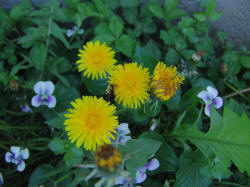You are currently browsing the category archive for the ‘Liver Cancer’ category.
 We’re told that an apple a day keeps the doctor away, but what exactly are the health benefits of apples? Here are ten reasons to heed the advice of that old proverb.
We’re told that an apple a day keeps the doctor away, but what exactly are the health benefits of apples? Here are ten reasons to heed the advice of that old proverb.
Bone Protection
French researchers found that a flavanoid called phloridzin that is found only in apples may protect post-menopausal women from osteoporosis and may also increase bone density. Boron, another ingredient in apples, also strengthens bones.
Asthma Help
One recent study shows that children with asthma who drank apple juice on a daily basis suffered from less wheezing than children who drank apple juice only once per month. Another study showed that children born to women who eat a lot of apples during pregnancy have lower rates of asthma than children whose mothers ate few apples.
Alzheimer’s Prevention
A study on mice at Cornell University found that the quercetin in apples may protect brain cells from the kind of free radical damage that may lead to Alzheimer’s disease.
Lower Cholesterol
The pectin in apples lowers LDL (“bad”) cholesterol. People who eat two apples per day may lower their cholesterol by as much as 16 percent.
Lung Cancer Prevention
According to a study of 10,000 people, those who ate the most apples had a 50 percent lower risk of developing lung cancer. Researchers believe this is due to the high levels of the flavonoids quercetin and naringin in apples.
Breast Cancer Prevention
A Cornell University study found that rats who ate one apple per day reduced their risk of breast cancer by 17 percent. Rats fed three apples per day reduced their risk by 39 percent and those fed six apples per day reduced their risk by 44 percent.
Colon Cancer Prevention
One study found that rats fed an extract from apple skins had a 43 percent lower risk of colon cancer. Other research shows that the pectin in apples reduces the risk of colon cancer and helps maintain a healthy digestive tract.
Liver Cancer Prevention
Research found that rats fed an extract from apple skins had a 57 percent lower risk of liver cancer.
Diabetes Management
The pectin in apples supplies galacturonic acid to the body which lowers the body’s need for insulin and may help in the management of diabetes.
Weight Loss
A Brazilian study found that women who ate three apples or pears per day lost more weight while dieting than women who did not eat fruit while dieting.
Source: http://www.healthdiaries.com/eatthis/10-health-benefits-of-apples.html
 We’re told that an apple a day keeps the doctor away, but what exactly are the health benefits of apples? Here are ten reasons to heed the advice of that old proverb.
We’re told that an apple a day keeps the doctor away, but what exactly are the health benefits of apples? Here are ten reasons to heed the advice of that old proverb.
Bone Protection
French researchers found that a flavanoid called phloridzin that is found only in apples may protect post-menopausal women from osteoporosis and may also increase bone density. Boron, another ingredient in apples, also strengthens bones.
Asthma Help
One recent study shows that children with asthma who drank apple juice on a daily basis suffered from less wheezing than children who drank apple juice only once per month. Another study showed that children born to women who eat a lot of apples during pregnancy have lower rates of asthma than children whose mothers ate few apples.
Alzheimer’s Prevention
A study on mice at Cornell University found that the quercetin in apples may protect brain cells from the kind of free radical damage that may lead to Alzheimer’s disease.
Lower Cholesterol
The pectin in apples lowers LDL (”bad”) cholesterol. People who eat two apples per day may lower their cholesterol by as much as 16 percent.
Lung Cancer Prevention
According to a study of 10,000 people, those who ate the most apples had a 50 percent lower risk of developing lung cancer. Researchers believe this is due to the high levels of the flavonoids quercetin and naringin in apples.
Breast Cancer Prevention
A Cornell University study found that rats who ate one apple per day reduced their risk of breast cancer by 17 percent. Rats fed three apples per day reduced their risk by 39 percent and those fed six apples per day reduced their risk by 44 percent.
Colon Cancer Prevention
One study found that rats fed an extract from apple skins had a 43 percent lower risk of colon cancer. Other research shows that the pectin in apples reduces the risk of colon cancer and helps maintain a healthy digestive tract.
Liver Cancer Prevention
Research found that rats fed an extract from apple skins had a 57 percent lower risk of liver cancer.
Diabetes Management
The pectin in apples supplies galacturonic acid to the body which lowers the body’s need for insulin and may help in the management of diabetes.
Weight Loss
A Brazilian study found that women who ate three apples or pears per day lost more weight while dieting than women who did not eat fruit while dieting.
Source: http://www.healthdiaries.com/eatthis/10-health-benefits-of-apples.html

